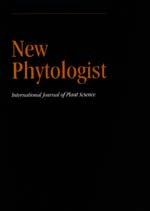Crossref Citations
This article has been cited by the following publications. This list is generated based on data provided by
Crossref.
Rogers, Hugo H.
Runion, G. Brett
Prior, Stephen A.
and
Torbert, H. Allen
1999.
Carbon Dioxide and Environmental Stress.
p.
215.
NORBY, R. J.
WULLSCHLEGER, S. D.
GUNDERSON, C. A.
JOHNSON, D. W.
and
CEULEMANS, R.
1999.
Tree responses to rising CO2in field experiments: implications for the future forest.
Plant, Cell & Environment,
Vol. 22,
Issue. 6,
p.
683.
Frazer, Lilyann Novak
1999.
One stop mycology.
Mycological Research,
Vol. 103,
Issue. 1,
p.
116.
Cairney, J.W.G.
and
Meharg, A.A.
1999.
Influences of anthropogenic pollution on mycorrhizal fungal communities.
Environmental Pollution,
Vol. 106,
Issue. 2,
p.
169.
Kytöviita, M.‐M.
Pelloux, J.
Fontaine, V.
Botton, B.
and
Dizengremel, P.
1999.
Elevated CO2 does not ameliorate effects of ozone on carbon allocation in Pinus halepensis and Betula pendula in symbiosis with Paxillus involutus.
Physiologia Plantarum,
Vol. 106,
Issue. 4,
p.
370.
Pritchard, Seth G.
Prior, Stephen A.
Rogers, Hugo H.
and
Peterson, Curt M.
2000.
Calcium Sulfate Deposits Associated with Needle Substomatal Cavities of Container‐Grown Longleaf Pine (Pinus palustris) Seedlings.
International Journal of Plant Sciences,
Vol. 161,
Issue. 6,
p.
917.
KASAI, KAZUHIRO
USAMI, TETSUYUKI
LEE, JAESEOK
ISHIKAWA, SHIN-ICHI
and
OIKAWA, TAKEHISA
2000.
Responses of Ectomycorrhizal Colonization and Morphotype Assemblage of Quercus myrsinaefolia Seedlings to Elevated Air Temperature and Elevated Atmospheric CO2..
Microbes and Environments,
Vol. 15,
Issue. 4,
p.
197.
Matamala, Roser
and
Schlesinger, William H.
2000.
Effects of elevated atmospheric CO2 on fine root production and activity in an intact temperate forest ecosystem.
Global Change Biology,
Vol. 6,
Issue. 8,
p.
967.
Hampp, Rüdiger
Nehls, Uwe
and
Wallenda, Thomas
2000.
Progress in Botany.
Vol. 61,
Issue. ,
p.
223.
Kytöviita, Minna‐Maarit
Le Thiec, Didier
and
Dizengremel, Pierre
2001.
Elevated CO2 and ozone reduce nitrogen acquisition by Pinus halepensis from its mycorrhizal symbiont.
Physiologia Plantarum,
Vol. 111,
Issue. 3,
p.
305.
Fransson, Petra M. A.
Taylor, Andrew F. S.
and
Finlay, Roger D.
2001.
Elevated atmospheric CO2 alters root symbiont community structure in forest trees.
New Phytologist,
Vol. 152,
Issue. 3,
p.
431.
Erland, Susanne
and
Taylor, Andy F. S.
2002.
Mycorrhizal Ecology.
Vol. 157,
Issue. ,
p.
163.
Agerer, Reinhard
Grote, Rüdiger
and
Raidl, Stefan
2002.
The new method ‘micromapping’, a means to study species-specific associations and exclusions of ectomycorrhizae.
Mycological Progress,
Vol. 1,
Issue. 2,
p.
155.
Jose, Shibu
Merritt, Sara
and
Ramsey, Craig L
2003.
Growth, nutrition, photosynthesis and transpiration responses of longleaf pine seedlings to light, water and nitrogen.
Forest Ecology and Management,
Vol. 180,
Issue. 1-3,
p.
335.
Langley, J. Adam
Dijkstra, Paul
Drake, Bert G.
and
Hungate, Bruce A.
2003.
Ectomycorrhizal Colonization, Biomass, and Production in a Regenerating Scrub Oak Forest in Response to Elevated CO2.
Ecosystems,
Vol. 6,
Issue. 5,
p.
424.
Brundrett, Mark C.
and
Cairney, John W.G.
2004.
Microorganisms in Plant Conservation and Biodiversity.
p.
105.
Lynch, Jonathan P.
and
St.Clair, Samuel B.
2004.
Mineral stress: the missing link in understanding how global climate change will affect plants in real world soils.
Field Crops Research,
Vol. 90,
Issue. 1,
p.
101.
Swaty, Randy L.
Deckert, Ron J.
Whitham, Thomas G.
and
Gehring, Catherine A.
2004.
ECTOMYCORRHIZAL ABUNDANCE AND COMMUNITY COMPOSITION SHIFTS WITH DROUGHT: PREDICTIONS FROM TREE RINGS.
Ecology,
Vol. 85,
Issue. 4,
p.
1072.
Middelhoff, Ulrike
and
Breckling, Broder
2005.
From single fine roots to a black alder forest ecosystem: How system behaviour emerges from single component activities.
Ecological Modelling,
Vol. 186,
Issue. 4,
p.
447.
Tingey, David T.
Johnson, Mark G.
and
Phillips, Donald L.
2005.
Independent and contrasting effects of elevated CO2 and N-fertilization on root architecture in Pinus ponderosa.
Trees,
Vol. 19,
Issue. 1,
p.
43.


